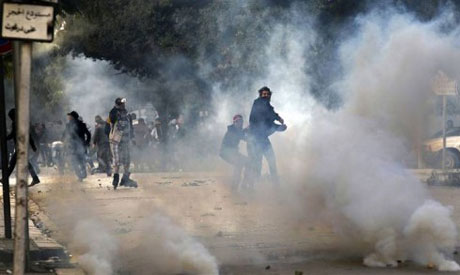
A demonstrator throws a stone at police during clashes in Tunis, Friday, Jan. 14, 2011, (AP).
In Tunisia’s Bourguiba Square, the walls are still covered with revolutionary slogans: “Down with the dictator,” “Freedom to Tunisian people,” “Ali Baba and the 40 thieves.”
Over six months have passed since revolts against regimes were instigated across the Arab world.
At first glance, one can see the youth of Tunisia still savouring their victory. Those who never dared to criticise the ousted president or even to chat quietly about politics now call him "the ousted" or the "dictator."
Mohammad Bouazizi was the 26-year-old street vendor in Tunisia who on 17 December, 2010 doused himself with what is believed to be paint thinner, lit a match and set himself on fire. His self-immolation was the first, highly-publicized spark in the blaze of revolts and toppled governments now being called “Arab Spring.”
To anyone sorting through the news that made it past Tunisia’s ensuing media blackout, two things were immediately apparent. One was the surprising scale with which the protests had spread and the ensuing violent crackdown by security forces; second and more important was the underlying and widespread condition that caused the protests – unemployment.
The social and political conditions surrounding Bouazizi's actions were ripe, and the incident - setting himself on fire after being harassed by a policewoman who confiscated his selling cart and produce for not having a permit - was a powerful expression of the despair felt by many in Tunisia and across the region.
As the protests continued to spread and more people took to the streets, it was clear that unemployment was only one component of Tunisian popular grievances. Rising food prices, rampant corruption and the progression of violence in the government’s crackdown all made up parts of the demonstrators’ refrain as major political upheaval became their main demand.
Zine El Abidine Ben Ali, Tunisia’s ousted president, fled to Saudi Arabia less than a month after protests started in Bouazizi’s city, Sidi Bouzid.
"May be nothing in my daily life has changed, but it will - for the better," says a young man confidently strolling with friends on the street late last week. He says he will definitely vote in the October’s elections.
In Algeria, Egypt and Mauritania, less than two days after Ben Ali’s plane took off, more desperate self-immolators began to follow Bouazizi’s lead. In Egypt alone, within a week of Ben Ali’s ouster six individuals attempted to set themselves alight.
Many of the cases across the three countries incited sarcastic comments from a cynical public, but as cynical as Egyptians are (or were at that time), when Abdo Abdel Moneim – the first to self immolate in front of the Egyptian Council of Ministers – was ordered to undergo psychological checks a mental institution, the population took note of the textbook dismissal of dissent by Egyptian security.
Following in the footsteps of Tunisia, Egyptian citizens started protesting on 25 January calling for the fall of the regime. The three-decade strongman Hosni Mubarak was ousted less than a month after his Tunisian counterpart.
Mohammad Bouazizi wasn’t the only Tunisian to commit suicide in protest. Lahseen Naji, another young man who electrocuted himself due to economic burdens, followed him. Another Tunisian, Ramzi Al-Abboudi, ended his life due to business debts.
Bouazizi’s act has become the dominant expression of the revolutionary soul that took over the Arab political scene. Tamim al-Barghouti, a prominent Palestinian-Egyptian poet and political scientist, addresses Mohammed Bouazizi in his poem “Tunisia.” Assad Abu Khalil, a Lebanese political scientist and political commentator, writing on the counter-revolution in May, titled his article “Mohammad Bouazizi still burns.”
Instead of one ever-ruling party and five artificial opposition groups, Tunisia now has more than 90 new parties struggling to find a place on the political scene. The autumn vote for a constituent assembly - members of which will rewrite the constitution - will be monitored by international and local observers.
Electoral officials are planning to draw up new registries accurately listing seven million eligible voters out of a population of 10.7 million. The October election will be followed by presidential and parliamentary elections at dates to be determined later.
Until that date, millions of young men, workers and jobless people remain in a daily struggle to secure their bread. Sit-ins and strikes persist in revealing the new rebel spirit of Tunisia, where maintaining the ability to make fair demands is as vital as free elections.
Short link: